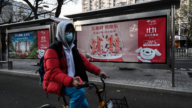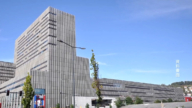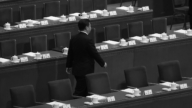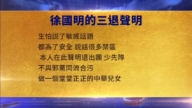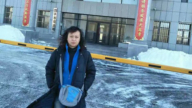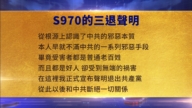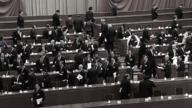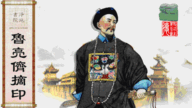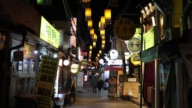【新唐人2014年02月18日讯】继中共广东东莞扫黄后,目前中国多地纷纷对各类娱乐场所进行了“突击扫黄”,评论指出,中国的娱乐场所、酒店多由高官“参股”,警方做靠山,中共本意不在扫黄,而是以扫黄来转移人们对前中共政法委书记周永康集团贪腐案的侦办方向。
中国大陆媒体周日报导说,除广东省外,全国共有8个省份至少9个城市,出动上千名警力对各类娱乐场所进行了“突击检查”,包括浙江杭州、甘肃兰州、山东济南、广西柳州、黑龙江哈尔滨等。
北京时政观察人士华颇分析,在中共高官持续落马,周案即将公布的时刻,中共掀起这场全国性扫黄风暴,实际上是转移侦办周永康集团贪腐案的大方向。
华颇:“我觉得用扫黄来转移人们对反腐的关注,所以我想首先是《央视》深入东莞,把镜头对准了黄、赌、毒的情况,其意图还是党内斗争的一种体现。以扫黄为突破口,来阻碍对既得利益集团的清洗,阻碍习、李的反腐行动。”
近两个多月来,媒体密集放风,中共将公布周永康集团贪腐案。12号,有海外媒体引述消息说,新年前已有5800多人涉入周案,而且这一规模还在不断扩大。
消息说,目前不少元老替涉及周案的高官向习近平求情﹔也有元老屡屡“提醒”,反腐应该注意策略和节奏,打击面不能太大,更有人警告,官员财产公开不宜操之过急,“否则一定会引起巨大的社会混乱与动荡”等。
2月9号,《央视焦点访谈》播出暗访东莞色情业的节目,当晚,当东莞出动近7000警力进行大扫黄。但大陆网民众口一辞的对《央视》的暗访表示鄙夷。随后,中共党媒《人民日报》发表系列评论,针对东莞扫黄引发的反弹进行指责。
华颇:“其实根本意图就是中央某些人提出:现在的工作重点不是反腐,反腐应该结束了,重点应该是黄、赌、毒社会丑恶现象。我想各地方也就是一阵风的运动,来应付一下,我想这阵风一过还是一切如常。”
华颇披露,各类娱乐场所背后都有中共官员、和公安充当保护伞,当地的一部分经济也靠小姐来支撑,所以这场扫黄不可能深入。
北京《经济观察报》引述一名东莞酒店业者的话表示,东莞的娱乐场所、酒店约3成股份是由高官暗地里持有,警方也是色情业的靠山,不少高级警官都是酒店常客,借此显示“这里很安全”,吸引客人。
曾在星级酒店做过收银员的庞小姐对《新唐人》说,东莞实际上就是中国各地的翻版,几乎每一个城市的星级酒店都有《央视》曝光的“莞式服务”。
原酒店收银员庞小姐:“我家亲戚前几年在北京和深圳的五星级酒店都开过桑拿,我在那里做过收银员,去店里的嫖客多是中共官员和警察,他们经常集体去嫖,嫖过之后由一个人去结账,结过帐以后还要求店里给他们开具餐饮的发票。”
16号,东莞4名镇委书记就扫黄不力公开道歉说,他们“负有不可推卸的责任”。评论认为,这些地方官员更应该引咎辞职。
庞小姐:“08年我在深圳做收银时,看到一个派出所长天天都到店里嫖,但很少买单,老板也没意见,因为他给店里带来大量客源,而且每次要扫黄前,他都会事先通风报信,然后店里让小姐们穿戴整齐,做‘正规’按摩,风头一过再继续营业。”
大陆业内人士说,东莞扫黄令色情产业链断裂,20万人需要另谋生计﹔有财政金融专家也分析,扫黄对东莞可能造成500亿元人民币的损失,即是东莞GDP的10%。
采访编辑/李韵 后制/舒灿
CCP nationwide anti-vice crackdown diverts Zhou’s case direction?
After the crackdown on prostitution in the southern Chinese
city of Dongguan, the Chinese regime has been carrying out
an “anti-vice campaign", with police raids targeting all kinds
of entertainment venues suspected to offer sex services.
Analysts say that with high ranked officials and the police
as major patrons of China’s entertainment venues and hotels,
the CCP’s aim isn’t to end the sex trade but to take away
public focus from the corruption case involving ex-secretary
Zhou Yongkang of the Central Politics and Law Commission.
On Sunday, Chinese media reported that
in addition to Guangdong province, thousands of police
from at least nine cities including Hangzhou, Lanzhou, Jinan,
Liuzhou, Harbin and Shandong made a sudden visit
to many places of entertainment.
Beijing politics watcher Hua Po says the nationwide anti-vice
storm is an attempt to divert the investigation direction of
Zhou Yongkang’s group corruption case with the time of CCP
officials’ sacking and Zhou’s case releasing.
Hua Po, Beijing politics watcher: “I think the anti-vice crusade
is to divert public attention on anti-corruption, and CCTV’s
bringing attention to pornography, gambling, and drugs issues
in Dongguan is itself a reflection of the CCP’s inner-Party struggles.
The anti-vice crackdown is to block
vested interest groups from being taken down,
and to block Xi and Li’s anti-corruption campaign."
The past two months saw much media coverage
on the CCP’s coming release of news
on the Zhou Yongkang group corruption case.
On Feb. 12, one media outlet quoted sources
who say Zhou’s case involves nearly 6,000 people
and the scale is still expanding in the new year.
Many implicated senior officials are reportedly pleading to
Xi Jinping for protection; some reminded that anti-corruption
proceedings should be careful not to cause wide damage.
Some warn that information on officials’ property
should not be released too hastily,
otherwise it will cause great social disorder and unrest, etc.
On Feb. 9, CCTV broadcast its undercover
investigation on the sex industry in Dongguan.
That evening, nearly 7,000 police were deployed
in an anti-vice sweep in Dongguan.
But many Chinese netizens were scornful
of CCTV’s secret investigation.
Later, state media People’s Daily published a series of
comments criticizing those against anti-vice sting in Dongguan.
Hua Po: “In fact, the basic intention is that some CCP officials
say that anti-corruption is no longer a focus and has been
dealt with by now; the current focus are social evils such as
pornography, gambling and drugs.
I think the local movement is just blowing hot air,
it will be business as usual after that."
Hua Po says the various entertainment venues are protected
under the umbrella of senior officials and police;
part of the local economy is supported by prostitution.
So it’s impossible for the anti-vice sweep to be thorough.
Beijing Economic Observer quoted someone in Dongguan’s
catering industry who says senior officials secretly hold
approximately 30% shares in Dongguan’s entertainment and
hotels industry; police are also major sex industry patrons;
many senior police officers frequent some hotels to imply
“it’s very safe here" and thus attract customers.
Former hotel clerk Ms. Pang told NTD that Dongguan
is no different from cities across the country,
as hotels in almost every city offer sex services.
Ms. Pang, hotel clerk: “One of my family members opened
five-star hotels in Beijing and Shenzhen few years ago and
I was a clerk at one.
Most clients are CCP officials and police.
They often go to prostitutes as group
and afterwards one of them would checkout for them
and request a catering invoice."
On Feb. 16, four Dongguan county secretaries apologized
publicly for ineffectively carrying out the anti-vice crackdown.
Commentators say these local officials should resign.
Ms. Pang: “When I was a clerk in Shenzhen in 2008, a police
station head had prostitutes every day and seldom paid for it.
My boss had no problem because
he brought a lot of customers to the store.
He also warned us before each anti-vice crackdown and our
hotel would dress up prostitutes as massage professionals.
They will continue after the anti-vice storm."
Mainland insiders say Dongguan’s anti-vice crackdown
broke the porn industry chain with
20 million people looking for new livelihood.
Some financial experts also analyzed the anti-vice possibly
resulted in a 50 billion yuan ($8.2 billion) loss in Dongguan
which is 10% of the GDP.
Interview & Edit/LiYun Post-Production/ShuCan



